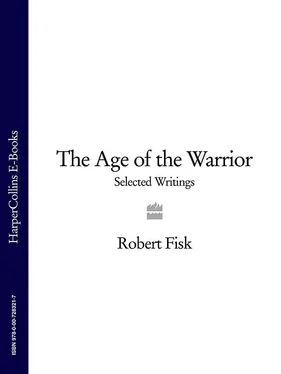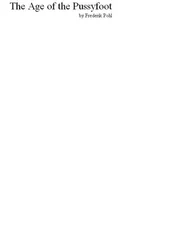Then, in words which have an ironic historical resonance, the Grand Mufti talked of the future. ‘He did not fear the Jews, their Stern, Irgun, Haganah [gangs]. The Arabs might lose at first, they would have many losses, but in the end they must win.’ The Zionists ‘will eventually crumble into nothing, and he did not fear the result, unless of course Britain or America… intervened, and even then the Arabs would fight and the Arab world would be perpetually hostile’. When his British visitor suggested that the Arabs might do better to accept part of Palestine rather than risk losing all, Haj Amin replied: ‘Who are we? A handful of exiles. Nothing. But we shall never give in or surrender our principles no matter what bribe is offered.’
Should the British talk directly to Haj Amin? As fighting continued in Palestine, the British Legation in Beirut reported to the Foreign Office on 27 November that Haj Amin ‘no longer regards us as Arab Public Enemy No 1’. But ‘if a decision unfavourable to the Arabs is reached at the United Nations… it is probable that the ex-Mufti [ sic ] will be exposed to pressure from his extremist followers… Contact even of a most informal sort with British officials might serve as a safety valve.’ The British memorandum, marked ‘Secret’, adds that although Haj Amin’s ‘dubious past renders the prospect of even unofficial contact with him distasteful’, it could not be denied ‘that he enjoys very considerable prestige and influence and he may still play a part in the future government of Palestine’. The Mufti had ‘learnt a lesson through backing the wrong side in the last war,’ and ‘advantage might be taken of his anti-Communist leanings’.
Riad Solh, the Lebanese prime minister, had already offered to arrange a meeting between the Mufti and a Beirut-based British diplomat called Evans, over cups of tea – Evans had been ‘non-committal’ to the idea – but ‘I think it would be all to the good for a member of my staff to see him occasionally,’ the Legation head wrote. It would now pay the British ‘hand over fist’ to exert any influence to avoid a wholesale clash with Palestinian Arabs. Meeting the Mufti as ‘an individual’ would not mean ‘that His Majesty’s Government had abandoned their principles or condoned the Mufti’s misguided [ sic ] past… if… he has had a change of heart, mild and discreet contacts with the British might give him a chance to prove it. If the leopard is still the same we shall soon find the spots under his henna.’
Beneath this eloquent letter, the British diplomat added in his own hand the damning remark that the US assistant military attaché in Lebanon had already paid a visit to the Mufti. By mid-December, General Cunningham was pleading from Jerusalem for pressure on Haj Amin ‘to get him to dissuade local Arabs from further violence… while we are still here’. But, the High Commissioner noted, ‘it is clear that we cannot approach the Arabs without taking parallel action against the Jews. We are, of course, doing all we can to point out to Jews the unmitigated folly of their actions which can only end in future bitterness which may well in the end mean disaster for their new State.’ Jewish claims that their actions were carried out by ‘dissident groups’ had proved to be untrue and ‘it can be seen that the Jews have inflicted many more casualties on the Arabs than the reverse. Practically all [Jewish] attacks have been against buses or in civilian centres.’ In a remarkable moment of anger, Cunningham concluded that ‘we have never at any time on the slightest excuse escaped vociferous and hysterical accusations by Jews that we were a people who were prone to brutal reprisals. Now they [the Jews] have themselves come out with reprisals of a kind which would not have crossed the mind of any soldier here, and which are an offence to civilisation.’
Cunningham’s plea for discussions with the Mufti was forwarded to the Foreign Office. Within days, however, the Legation in Beirut was ordered to make no contact with Haj Amin. British MPs had long demanded his trial for war crimes, and our ally King Abdullah of Jordan – the late King Hussein’s grandfather – hated the Mufti. The British departed from Palestine in disgrace, leaving Arab and Jew to fight for the land. Three-quarters of a million Palestinians fled or were expelled from their homes. The Arabs did not eventually win, as Haj Amin had predicted, and the Israeli state did not end in disaster as Cunningham suggested it might. Israeli spokesmen regularly condemn the Mufti for his flirtation with Nazism, and have sought to demonise the Palestinians with his name. But recent research suggests that he was an Arab nationalist rather than a national socialist – his fairest biographer is a former Israeli military governor of the occupied West Bank. *
The Mufti died in Beirut in 1974, ignored and largely forgotten even in Lebanon. Among the mourners at his funeral was Yasser Arafat.
The Independent , 20 February 1999
*Zvi Elpeleg,The Grand Mufti: Haj Amin al-Husseini, Founder of the Palestinian National Movement (London, Frank Cass, 1993).
‘Thank you, Mr Clinton, for the kind words’
In August, 1998, following attacks on the US embassies in Nairobi and Dar es-Salaam and at the height of the scandal over his affair with intern Monica Lewinski, President Bill Clinton launched a cruise missile attack on Sudan and on a base in Afghanistan at which Osama bin Laden was supposed to be living. In Khartoum, the missiles destroyed a factory which the Americans claimed was producing chemical warfare components. They later admitted that it was manufacturing medicine for Sudan’s deprived population. Several al-Qaeda supporters – including two British citizens – were killed in the Afghan raid. But bin Laden was not there .
If there is one thing that enrages the Arab world about the United States government – apart from its betrayal of the principles of the peace process, its unconditional support for Israel, its enthusiasm for sanctions that are killing thousands of Iraqi civilians and its continued presence in Saudi Arabia – it is the administration’s habit of telling Arabs how much it loves them.
Before every air strike, the President assures his future victims how much he admires them. Ronald Reagan told the Libyan people that America regarded them as friends – then he unleashed his bombers on Tripoli and Benghazi. George Bush waffled on about Iraq’s history as the birthplace of civilisation and America’s friendship for ordinary Iraqis – before bombing every town and city in Iraq. And this week, as his missiles had just left their ships in the Red Sea and the Arabian Gulf, there was Bill Clinton telling the people of the Middle East that Islam was one of the world’s great religions.
As my Beirut grocer put it to me yesterday – his smile as crooked as his message – ‘it’s good of Mr Clinton to tell me about my religion. It’s always nice to be informed that religion doesn’t condone murder. Thank you, Mr Clinton.’ My grocer was not being polite. Clinton’s admonition from the White House – ‘no religion condones the murder of innocent men, women and children’ – came across in the Middle East as patronising as well as insulting, coming as it did from a man who is embroiled in a sex scandal. ‘That filthy man’ is how he was called by an Egyptian over the phone to me yesterday, although the Arabs have not grasped the complexities of Mr Clinton’s adventures with Miss Lewinsky (mercifully, there is no word for ‘oral sex’ in Arabic).
What was immediately grasped in the region yesterday, however, was the ease with which the Americans could once again choose an enemy without disclosing any evidence for his guilt and then turn journalists and television commentators into their cheerleaders. ‘I was so sickened by the constant use of the word “terrorism” that I turned to French radio,’ a Palestinian acquaintance told me at midday. ‘And what happened? All I heard in French was “ terroristes, terroristes, terroristes ”.’ He was right. Almost all the reporting out of America was based on the accuracy of the ‘compelling evidence’ – so “compelling” that we haven’t been vouchsafed a clue as to what it is – that links Osama bin Laden to the ferocious bombings in Kenya and Tanzania. Several times yesterday, I had to interrupt live radio interviews to point out that the journalists in London and Washington were adopting the US government’s claims without question.
Читать дальше












